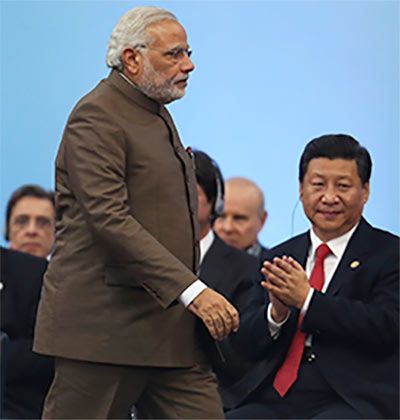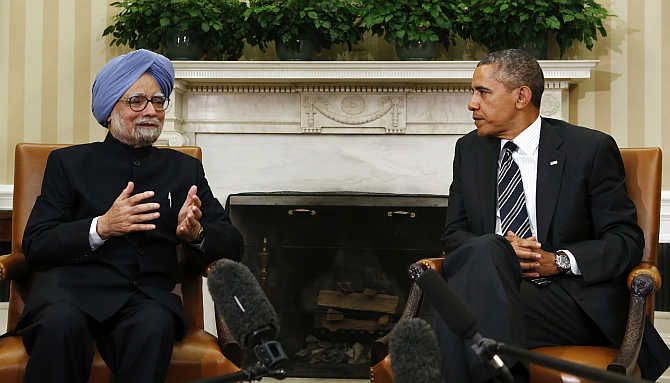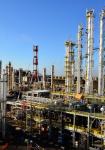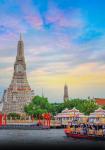 'The Modi-Xi and Modi-Obama meetings, within an interval of just 12 days, are juxtaposed superbly at a crucial point in the prime minister's life.'
'The Modi-Xi and Modi-Obama meetings, within an interval of just 12 days, are juxtaposed superbly at a crucial point in the prime minister's life.'
'Can Modi carve out a win-win situation with the superpower and the emerging superpower at the same time?' Sheela Bhatt/Rediff.com explains what we can expect from the prime minister's crucial diplomatic meetings ahead.
When Prime Minister Narendra Modi welcomes Chinese President Xi Jinping at Ahmedabad's Sardar Vallabhbhai Patel International Airport on Wednesday, September 17, it will kick-start his dream of transforming his country into 'Modi's India'.
Prime Minister Modi's summits with three of the world's powerful leaders in Tokyo, New Delhi and Washington, DC this month marks a new chapter in Indian diplomacy in the post-Manmohan Singh decade.
Modi's main focus is on how and how quickly he can uplift the economy to achieving a growth rate of 8 per cent every year. At the moment, his political instincts, interests and needs converge with the country's hunger for higher economic growth. Modi will move ahead with whatever makes the economy and -- eventually him -- stronger.
For his economic plan to succeed, he needs investment and technology from China, the United States, Japan, Germany and South Korea amongst many countries. He wants to boost infrastructure through the Foreign Direct Investment route. He wants manufacturing in India to go up from 16 per cent to 25 per cent in less than a decade.
In the process, Modi wants more and more joint collaborations of items and weapons India imports traditionally.
On September 18, Modi expects Xi to announce his intent to invest more than what Japan agreed to on September 1.
Image, above: Chinese President Xi Jinping applauds Prime Minister Narendra Modi at the BRICS Summit in Fortaleza, Brazil, July 15, 2014. Photograph: Nacho Doce/Reuters
The joint statement after Modi's meeting with Japanese Prime Minister Shinzo Abe expressed the intention, 'to realise 3.5 trillion yen of public and private investment and financing from Japan, including Overseas Development Assistance to India in five years.'
China has to make a crucial increase in its FDI to make the September 17-18 visit a great success. Some reports suggest China will rival Japan and announce investments of around $100 billion while other optimistic analysts claim it could be a massive $200 billion. Critics view both figures with scepticism.
Chinese labour laws are getting stringent as Xi initiates action against corruption and other social maladies in his country. But more than Japanese businessmen, Chinese businessmen are battle-ready to conquer Indian markets.
Many of them find India better to invest in than Africa or Latin America if their government gives them the full backing required once they put their money in Indian projects.
Xi's visit is important for this particular reason because Chinese manufacturers and businessmen want the two 'no-nonsense' leaders to adopt a business-like approach for better trade ties.
Two Pinnacles: Modi-Xi and Modi-Obama
The Indian side hopes that Xi will improve trade with India. It is clear from National Security Advisor Ajit Doval's meeting with Xi in Beijing last week that the contentious issues between the two Asian giants can wait.
The pointers from Beijing reveal that China is surely investing not just in India, but, also, in Modi. By electing to go to Ahmedabad and identifying with Modi's roots is win-win diplomacy for both leaders.
All eyes are on the Modi-Xi and Modi-Obama meetings and a comparison will sharply be drawn on Modi's performance as a host to Xi and Obama's role as the host at the White House.
Xi and Modi have many national issues pending between them starting from the border dispute to Tibet to managing the balance of power in South Asia, but regardless of those factors, Modi will play a warm host befitting Indian tradition.
The Gujarat government is pulling out all stops to make it a memorable trip, particularly the candle-light dinner on the banks of the Sabarmati river. More than 100 varieties of Gujarati food will be served to 50 plus guests.
China and Modi are not unknown to each other while Modi and America carry the huge baggage of the recent past. Obama will also play a stylish host, but he has the difficult task of very subtly handling his Indian guest's hidden bruised ego.
When Obama hosts a dinner for Modi on September 29 it will mark some closure for the former Gujarat chief minister who was denied a US visa in 2005.
It will be a reminder that the leader at the dinner table with the American president is one whose entry the US State Department had resisted just a decade ago. A rare humiliation any politician has had to endure.
From no-visa-to-the-dinner-table-at-the-White House is the stuff of political legend. The massive electoral mandate for Modi has changed reality. Obama will play the perfect host because of the American assessment that Modi can deliver.
The feeling among American analysts is that if the visit leaves Modi pleased, then transactional relations between India and America can move forward in search of a new level.
The Americans would like to give it a try. Both sides confidently maintain that the past denial of a US visa is not an issue. Soon from some corner of Washington, DC, voices will emerge that, 'Modi has stood the legal test in the Gujarat riots.'
This would help the Obama administration to make Modi feel comfortable when it plays host. In fact, those privy to US plans in Washington claim, "The visa issue is no more an ethical obstacle. The Obama administration has no confusion in welcoming Modi. There is no moral dilemma. Rest assured you will see glowing visuals of the Modi-Obama meeting."
Modi, on his part, will demonstrate his strengths on American soil. The massive support he enjoys will culminate in spectacular visuals at the event organised by his Indian-American supporters at New York's Madison Square Garden on September 28.
 Modi and Obama, both excellent communicators, are likely to overshadow the past with panache and will talk about democracy, terrorism and the defence partnership, looking straight into the cameras.
Modi and Obama, both excellent communicators, are likely to overshadow the past with panache and will talk about democracy, terrorism and the defence partnership, looking straight into the cameras.
Image: The last time an Indian prime minister visited the White House was almost to the day before Prime Minister Narendra Modi arrives at the Oval Office. Then prime minister Manmohan Singh with US President Barack Obama, September 27, 2013. Photograph: Kevin Lamarque/Reuters
A diplomat who has served India for more than three decades told Rediff.com in an off-the-record conversation that, "Modi and Xi are different leaders of vastly different nations, but they do have similarities. Even Modi and Obama have many common personality traits."
This strategic thinker, who has met all three leaders, said, "Xi and Modi will have good chemistry as both are strong nationalist leaders and they have a common agenda for economic ties. It will make them comfortable. Modi has a good five years ahead of him and Xi has around 8 years to take China ahead. It is clear Xi is placing a huge bet on Modi. China is investing in Modi's ego. Chinese leaders like to deal with strong leaders. Modi is conceived as a strong leader."
Chinese journalist Lu Tang, who has studied at Vallabh Vidyanagar, Gujarat and the Jawaharlal Nehru University in New Delhi and now works at the Xinhua news agency, says, "When Modi was chief minister, Gujarat was introduced to the Chinese, but after he has become prime minister, Gujarat has become much more popular in China."
While talking of the possible chemistry between Modi and Obama, the retired Indian diplomat points out, "Modi and Obama are both loners. Obama and Modi, both, open up better when they speak privately one-on-one, they are not so comfortable in a group. Both are clever amongst their peer group and both have the gift of the gab when addressing a large audience."
"Both leaders have climbed the ladder all alone on the sheer strength of their talent," the diplomat added. "Both want to leave behind the Devyani Khobragade incident and the denial of the visa issue."
To understand India's actual position in the triangle, one has to see the political and economical standing obviously. America and China are among the top three on India's list of trading partners, but on a similar list for China and America, India does not feature even among the top ten.
Modi's meeting with Abe in Tokyo on September 1, with Xi in New Delhi on September 18 and with Obama on September 30 in Washington will give India access to new opportunities and raise the promise of faster economic growth.
It will give clarity to the political path that India may eventually adopt in a couple of years from now. Modi's meetings in New Delhi and Washington will decide if India's technological sector, high-tech defence, infrastructure development, manufacturing sector will get the momentum it deserves.
More importantly, the core outcome of these two meetings will reveal India's current political standing in international affairs. As it happened in Japan, the post-summit joint statements spoke more or less about the financing of public and private projects in infrastructure, communication and transport systems.
There will be talk of clean energy, agriculture and an education partnership in Washington and with the Chinese, the talks will focus on the energy and manufacturing sectors, smart cities, industrial parks, roads and railways.
A senior diplomat who has served in China reveals that political negotiations are tough with China. In fact, tougher than America, he insists. China has ambitious plans for the South China Sea, the maritime Silk Route and also Central Asia.
How much political space it will give India in the future is what India has to judge carefully.
An official who has dealt with China and America closely for many years told Rediff.com "China wants India to remain neutral in its battles on many fronts in Asia and vis-a-vis America -- whether it is issues with Japan, the South China Sea or Vietnam. China wants the world to move towards multi-polarity. India is important in that process."
China wants India to remain politically nonaligned before it opens its moneybags. It wants India to do away with an 'anti-China' orientation and wants to buy time with America. It is against such a backdrop that Modi's meeting with Obama will take place.
"Modi," the retired diplomat, points out, "is meeting Obama when the American leader's attention is distracted on issues which do not matter to India directly. Like Ukraine, Iraq, Syria and the Middle East. But as the Indian economy has started going upward, America wants to enter into defence deals. It has shown readiness to go with Modi's idea of starting production in India."
The challenge before Modi: Convert hype into substance
Modi's abilities will be tested as he negotiates the expansion of economic cooperation with China and strives for a balance amongst India's other vital interests.
The Modi-Xi and Modi-Obama meetings, within an interval of just 12 days, are juxtaposed superbly at a crucial point of time in the prime minister's life. It will test Modi's deft handling to obtain what India is aiming for.
Can Modi carve out a win-win situation with the superpower and the emerging superpower at the same time?
After Modi's Nepal, Bhutan and Japan visits, observers are confident that the prime minister may not trust other countries beyond a point, but he will judiciously try to use one card against another.
If he can use the hype from his Japan visit to press China, then the forward movements with Beijing will help Modi arrive in Washington with renewed confidence.
Since the Indian economy is gaining strength, he will be able to play his cards well unlike his predecessor Manmohan Singh whose diplomacy could not move forward successfully because of the global economic downturn that affected India's growth.
Like Xi and Obama, Modi is equally political. Xi will be less rigid with Modi while Obama will be less formal. At both meetings, the atmospherics will not be what it was during the Modi-Abe encounter in Kyoto, but Modi will have the close interactions needed to dub the summit-level diplomatic endeavours a success.
The air of warmth in Gujarat is likely to galvanise India-China relations. Modi has already met Xi at the BRICS summit in Brazil, but he will meet Obama after his government took a tough stand on the WTO issue.
It is important to note that Modi firmly introduced his intentions by taking the Bali decision soon after his meeting with US Secretary of State John Kerry in New Delhi.
Most of the many diplomats Rediff.com spoke to felt Modi's meeting with Xi is more important, more complex, than his rendezvous at the White House.
Xi's visit will set the mood with the important neighbour that matters most to India.
China became India's largest trading partner, overtaking America in March 2008. Along with it has come an unsustainable trade deficit that hovers around $40 billion.
In the same breath, many diplomats say relations with America are equally important because in real terms India's business with America and potential business with America, particularly in software and defence, is so huge that America will keep attracting attention all time.
American FDI investment in India far exceeds China's investments. Also, for issues like United Nations Security Council membership, Nuclear Security Group membership to the issue of the fight against global terrorism, there is no option but to talk to America.
Also, India is so engulfed with American soft power that Apple and Google have encroached upon the Indian landscape inevitably.
But, again, China and India's current bilateral trade is larger than the combined bilateral trade of Germany, Japan and the United Kingdom with India. "We live every day with China," one diplomat said, "so the Modi-Xi meeting is more important by any yardstick."











